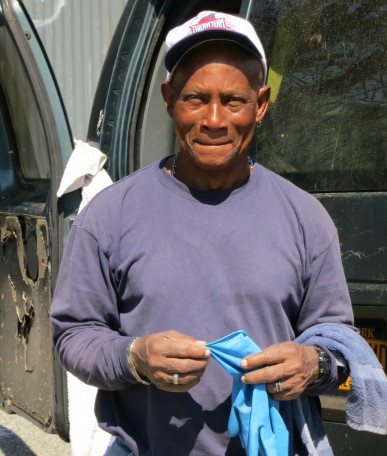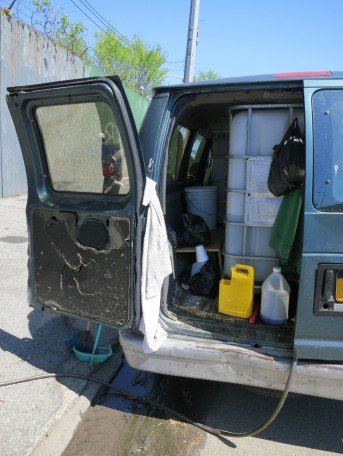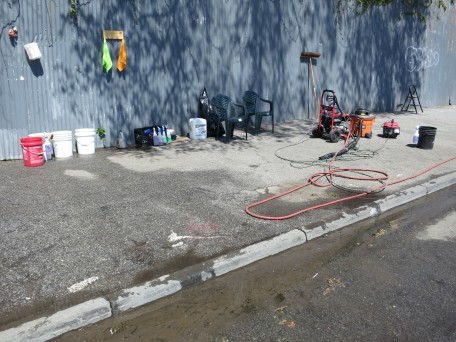
Julio Almonte, originally from the Dominican Republic, operates a hand car-wash on 202nd Street and the Harlem River.
ON THE last block of East 202nd Street, in the Inwood section of Manhattan, Roi Rodriguez leans against a corrugated metal wall, checking his iPhone, while Julio Almonte and an assistant wash his car. Almonte doesn’t work in a building. His business doesn’t even have a name. He washes cars on the street. All he needs to clean Rodriguez’s car are a few buckets, some rags, a Shop-Vac, and a pressure washer powered by a small generator. Inside his van is a 250-gallon tank filled with water. At the end of the day – Almonte works from 8 am to 7 pm – everything fits back inside the van.
In a small no-man’s-land bounded by the Harlem River, the New York City Housing Authority’s Dyckman Houses, and a Con Edison facility, exists an unofficial car wash district. The sound of the generators is everywhere, bright yellow rags dry on chain-link fences, and soapy water flows down the gutters while men power-wash the soap off newly cleaned vehicles. Plastic chairs are set up in the shade for customers to sit while they wait. The sidewalks are littered with each operation’s attendant van, buckets, and hoses. There is no reason to come to this little neighborhood of parking lots, auto-body shops, and nightclubs during the day – unless you want your car washed.
Julio Almonte, 67, was born in Monte Plata in the Dominican Republic but now lives in the Dyckman Houses, a block from where he washes cars. He worked at a traditional brick-and-mortar car wash until about a month ago, when he decided to go out on his own. He makes a lot more money this way, he says. Almonte speaks no English, but his current customer, Roi Rodriguez, who is Dominican but was born in New York, offers to translate.
Almonte charges $15 for a car wash ($20 for vans), and $15 for a wax. “It’s about the same price as a regular car wash,” says Rodriguez. The difference is quality. “I really like their work ethic, they seem like they’re hands-on, into it. They don’t get paid much at a regular car wash. I wouldn’t expect their heart and soul to be into it.” For $15, Almonte and his assistant have already been working on Rodriguez’s car for half an hour.

Almonte’s van has been customized for car washing. Inside is a 250-gallon water tank that connects to his pressure washer, which is powered by a portable generator.
There are at least five street car washes on the blocks of 202nd Street and 201st Street that dead-end into the Harlem River, and the block of 9th Avenue that connects them. It’s a perfect location: just north of the end of the Harlem River Drive and just below 207th Street, a major thoroughfare that leads into the Bronx via the University Heights Bridge. Ninth Avenue is a natural short-cut between the two: a one-way stretch heading north that conveniently bypasses the lights and traffic of 10th Avenue and its intersection with 207th Street. Nobody lives on these few blocks, so there is no one to complain about the noise or the mess, and there is always lots of parking.
I approached several other street car washers, but they were reluctant to speak to me. From his chair in the shade, one customer agreed with Rodriguez, saying that he came here because it was a little cheaper and his car got more attention than at a regular car wash. Another customer said he knew of other street car wash zones in the Bronx and elsewhere uptown, but that he had been coming to this neighborhood to get his car cleaned for more than 10 years.
One car washer, whose friend happened to be nearby and could translate, said that he had been washing cars here for years, but didn’t want to be interviewed because he recently had been having trouble with the police. He suspected a fellow car washer was calling the cops on him in an effort to take his spot.

The sidewalk in front of Almonte’s car wash, with two chairs for waiting customers. At least four other illegal hand car-washes operate nearby.
Washing cars on the street is illegal. Rodriguez looked up the relevant statute on his iPhone as he waited. “It’s a parking violation,” he said. “Washing or fixing a car on the street.” Down the block from where Almonte was working, several city employees were washing two front-end loaders with water from a fire hydrant. No one seemed worried about getting in trouble. “I don’t see it being a big problem,” said Rodriguez. “They’re working, trying to earn a living, it’s definitely an honest way of doing it.”
He decides to spend another $15 for a wax. Almonte asks for the keys and pulls Rodriguez’s car onto the sidewalk, alongside the corrugated metal wall. He goes to his van for waxing supplies, and begins meticulously buffing on the wax. The way he was doing it, it figured to be another half-hour job.